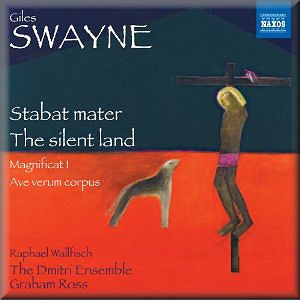 |
 |
|


alternatively
CD:
MDT
AmazonUK
AmazonUS
Sound Samples & Downloads
|
Giles SWAYNE (b. 1946)
Magnificat I (1982) [4.18]
The silent land (1997) [22.58] (2)
Ave verum corpus (2003) [3.08]
Stabat mater (2004) [36.18]
African traditional
O Lulum [1.37] (1)
 The La Jola people, Senegal (1)
The La Jola people, Senegal (1)
Raphael Wallfisch (cello) (2)
The Dimitri Ensemble/Graham Ross
rec. All Hallows Chuch, Gospel Oak, London, 7-9 April 2010, except for O Lulum. Senegal, 1982
 NAXOS 8.572595 [68.18]
NAXOS 8.572595 [68.18] 
|
|
|
This disc presents a selection of choral music by Giles Swayne
from the last twenty years. It forms a useful overview of the
interesting trajectory of Swayne’s career. Trained at Cambridge
and the Royal Academy, where he studied with Harrison Birtwistle,
Swayne has been heavily influenced by African music. His field
trip in the 1980s to Senegal to record music of the La Jola
people had a direct influence on the Magnificat on this disc.
And though Swayne has now come to rest in Cambridge, where he
became composer-in-residence at Clare College in 2008, he spent
some time living in Ghana. The disc celebrates the three main
influences on Swayne’s music: Latin plainchant (Swayne was brought
up a Catholic), Tudor polyphony and traditional African music.
The disc opens with an extract from a Senegalese ploughing song,
O Lulum recorded by Swayne in 1982. This is followed
by Magnificat I which makes use of material from the
Senegalese song. O Lulum appears at the beginning and
end of the piece, but the way that Swayne sets the Latin text
in a polyrhythmic manner owes much to other African traditional
musics. Magnificat I is a tricky piece to bring off,
requiring a rhythmic dexterity which the Dimitri Ensemble exhibit
perfectly. The result is as celebratory and exhilarating as
one could wish.
The silent land was written as a result of a commission
for a piece in memory of a friend’s husband. The couple had
been devout atheists, so that Swayne conceived of a scheme to
set Requiem texts which make no mention of either God, punishment
or reward. Swayne uses lines from Dylan Thomas’s poem Do
not go gentle into that good night, Christina Rossetti’s
When I am dead my dearest, Robert Louis Stevenson’s Requiem
plus lines from the Requiem mass.
The choral part is centred around and focused on a solo cello
which represents the individual soul and the piece concentrates
on the acceptance of human loss. The long final section consists
simply of the choir repeating the words Requiescat in pace,
dona eis requiem aeternam, whilst the cello sings a long
anguished line.
Swayne uses a forty-part choir. Each of the eight choirs consists
of an SATB group plus a soloist. The eight soloists also come
together as a semi-chorus (SSAATTBB). When using all forty parts,
Swayne’s textures are difficult and dense, but these contrast
with magically transparent sections for reduced numbers of voices.
The silent land isn’t an easy piece: the cello part explores
the depths of anguish in a musical language which is angular,
difficult, angry and expressive and the chorus back the soloist
up. But the result is enthralling and I would love to hear it
live. The Dmitri Ensemble number just forty singers so, rather
impressively, they are singing this music one voice to a part.
The performance is confident and technically strong, but more
than that it is expressive and moving. The solo cellist is Raphael
Wallfisch who plays Swayne’s cello part in a richly vibrant
manner.
Ave verum corpus is a smaller-scale piece, written for
just four-part chorus in 2003, for Clare College choir. And,
like the Magnificat, is probably much more accessible
to other choirs to sing.
Finally there is Swayne’s most recent piece on the disc, a huge
setting of the Stabat Mater for unaccompanied eight-part
chorus and four soloists. The poem consists of eight syllable
lines and Swayne uses a series of eight-node modes, giving each
line its own mode. It has an extra-musical dimension as well:
Swayne seeks to place the narrative of the grieving mother into
our contemporary political landscape. He includes extra sections
setting Hebrew, Aramaic and Arabic and dedicates the piece to
the grieving mothers of Israel and Palestine.
Swayne’s extra texts come from the Jewish Kaddish, a Hebrew
blessing of the dead from the Babylonian Talmud and part of
the Muslim burial service. The final section includes words
from the Agnus Dei of the mass, is intended to unite
all three religious cultures in a prayer for peace.
Though Swayne’s writing is angular and sometimes jagged, with
expressive dissonances, his textures are often transparent and
reveal his love of polyphony, but distilled through a modern
sensibility. His use of soloists means that the piece has a
satisfying variety of textures. But, Stabat Mater is
a long and difficult piece, and the concluding prayer for peace
is by no means a radiantly positive conclusion. There were moments
when I could not help wondering whether the piece outstayed
its welcome, whether it would have benefited from being a little
shorting. But there is no denying the commitment of the Dmitri
Ensemble and their soloists who are all drawn from the choir.
The booklet includes the texts in English - except for the Dylan
Thomas which is omitted, presumably for copyright reasons -
and the texts in the original languages are available from Naxos’s
website.
This disc is a hugely impressive achievement from the Dmitri
Ensemble and conductor Graham Ross. Ross is himself a composer
and shows great sympathy for Swayne’s music. The performances
of Swayne’s difficult music are technically accomplished, profoundly
satisfying and vividly expressive. This is contemporary choral
music at its best, and it is available at super-budget price.
Robert Hugill
|
|















